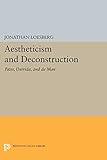Aestheticism and Deconstruction : Pater, Derrida, and de Man / Jonathan Loesberg.
Material type: TextSeries: Princeton Legacy Library ; 1208Publisher: Princeton, NJ : Princeton University Press, [2014]Copyright date: ©1991Edition: Course BookDescription: 1 online resource (248 p.)Content type:
TextSeries: Princeton Legacy Library ; 1208Publisher: Princeton, NJ : Princeton University Press, [2014]Copyright date: ©1991Edition: Course BookDescription: 1 online resource (248 p.)Content type: - 9780691607153
- 9781400862214
- 801.95 20
- PN98.D43
- online - DeGruyter
- Issued also in print.
| Item type | Current library | Call number | URL | Status | Notes | Barcode | |
|---|---|---|---|---|---|---|---|
 eBook
eBook
|
Biblioteca "Angelicum" Pont. Univ. S.Tommaso d'Aquino Nuvola online | online - DeGruyter (Browse shelf(Opens below)) | Online access | Not for loan (Accesso limitato) | Accesso per gli utenti autorizzati / Access for authorized users | (dgr)9781400862214 |
Browsing Biblioteca "Angelicum" Pont. Univ. S.Tommaso d'Aquino shelves, Shelving location: Nuvola online Close shelf browser (Hides shelf browser)

|

|

|

|

|

|

|
||
| online - DeGruyter British Genres : Cinema and Society, 1930-1960 / | online - DeGruyter Blackout : Reinventing Women for Wartime British Cinema / | online - DeGruyter The Epistolary Moment : The Poetics of the Eighteenth-Century Verse Epistle / | online - DeGruyter Aestheticism and Deconstruction : Pater, Derrida, and de Man / | online - DeGruyter Neverending Stories : Toward a Critical Narratology / | online - DeGruyter The Skeptic Disposition : Deconstruction, Ideology, and Other Matters / | online - DeGruyter Stevens and the Interpersonal / |
Frontmatter -- Contents -- Acknowledgments -- Introduction. The Aestheticism of Deconstruction -- One. What Is Art for Art's Sake and How Could It Be Anything Else? -- Two. Studies in the Histories of The Renaissance -- Three. Deconstruction: Foundations and Literary Language -- Four. Deconstructive Aesthetics: Literary Language, History, Ideology -- Five. Aesthetic Analysis and Political Critique -- Afterword. Aesthetidsm, Journalism, and de Man's Wartime Writings -- Notes -- Works Cited -- Index
restricted access online access with authorization star
http://purl.org/coar/access_right/c_16ec
Considered an exemplar of "Art-for-Art's Sake" in Victorian art and literature, Walter Pater (1839-1894) was co-opted as a standard bearer for the cult of hedonism by Oscar Wilde, and this version of aestheticism has since been used to attack deconstruction. Here Jonathan Loesberg boldly uses Pater's important work on society and culture, Studies in the History of the Renaissance (1873), to argue that the habitual dismissal of deconstruction as "aestheticist" fails to recognize the genuine philosophic point and political engagement within aestheticism. Reading Jacques Derrida and Paul de Man in light of Pater's Renaissance, Loesberg begins by accepting the charge that deconstruction is "aestheticist." He goes on to show, however, that aestheticism and modern deconstruction both produce philosophical knowledge and political effect through persistent self-questioning or "self-resistance" and in the internal critique and destabilization of hegemonic truths. Throughout Loesberg reinterprets Pater and reexamines the contributions of deconstruction in relation to the apparent theoretical shift away from deconstruction and toward new historicism.Originally published in 1991.The Princeton Legacy Library uses the latest print-on-demand technology to again make available previously out-of-print books from the distinguished backlist of Princeton University Press. These editions preserve the original texts of these important books while presenting them in durable paperback and hardcover editions. The goal of the Princeton Legacy Library is to vastly increase access to the rich scholarly heritage found in the thousands of books published by Princeton University Press since its founding in 1905.
Issued also in print.
Mode of access: Internet via World Wide Web.
In English.
Description based on online resource; title from PDF title page (publisher's Web site, viewed 30. Aug 2021)


